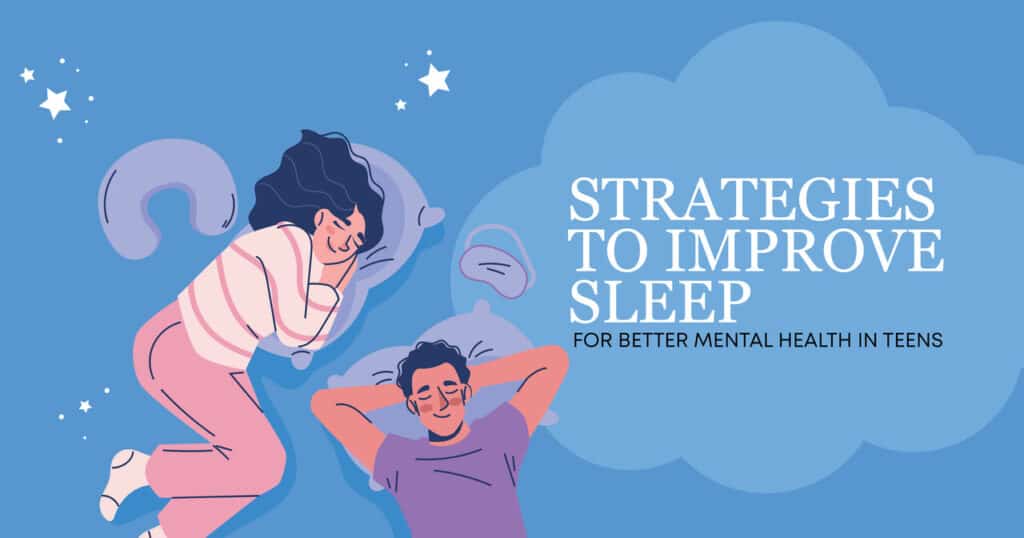While sleep is a luxury most teenagers can do without, especially for most teenagers, it is also indispensable today. Sleep is a part of one’s health, and its impact on teen mental health is incredible. This article will explore the relationship between sleep and teen mental health, why it’s crucial that teens obtain quality rest, and give actionable strategies to help teens improve their sleep for better mental health.
Why Sleep Is Crucial for Teen Mental Health
Sleep is an essential aspect of mental health, particularly in adolescence. This phase of an individual’s life cycle undergoes a great deal of physiological and psychological changes, and it requires sleep to facilitate the proper functioning of both the body and the mind.
Sleep and Cognitive Functioning
Cognitive skills such as memory, attention, and emotional regulation develop rapidly during adolescence. Deep sleep promotes memory consolidation, processes emotions, and detoxifies the wastes that gather in wakefulness. Teens deprived of quality sleep have problems with concentrating, reduced problem-solving abilities, and memory lapses, to name a few, thus seriously impairing performance in school.
Emotional Regulation and Mental Health
Sleep has a great influence on emotional regulation. Teenagers who have fewer hours of sleep tend to be irritable, anxious, and easily upset in addition to having mood swings. This vulnerability increases the chances of psychological disorders, such as depression and anxiety. Numerous studies have linked it to the risk of mood disorders in adolescents.
Presenting information on the ability of sleep to work on mental health in teenagers is worth mentioning: Sleep deprivation destroys one’s ability to process emotions. A sleep-deprived teenager may easily overreact to their stressors, be more emotionally reactive, and be less capable of coping with challenges.
Physical Health and Sleep
Poor sleep has also been associated with health issues that affect the mental well-being of teenagers. Lack of sleep leads to obesity, low immunity, and chronic diseases, which can exacerbate the situation and cause stress, therefore increasing stress and other psychological disorders. Sleep enhances physical recovery in the body, making a teenager who cannot sleep unmotivated and unable to increase energy levels.
Common Sleep Challenges Faced by Teens
The sleeping challenges that teenagers face are unique. They are supposed to go to school, engage in some extracurricular activity, and adhere to peer pressure, thus crippling their ability to catch up on some sleep. Some of the factors responsible for poor sleep habits among teenagers include:
Biological Changes and Sleep Patterns
Adolescence is a time of significant fluctuation in the body’s circadian rhythm. The body, as part of undergoing puberty, naturally desires a later sleep-wake cycle. Teens typically tend to be at their most alert at night, and bedtime becomes increasingly challenging to achieve. Unfortunately, many teens start school relatively early, and sleep deprivation becomes chronic.
Digital Distractions
The biggest barrier to quality sleep is the omnipresent feeling of screens. Whether texting friends, checking social media, or playing video games, electronic devices interfere with sleep. Phones, tablets, and computers emit blue light that breaks into melatonin production, which controls sleep. Many teenagers end up staying up far longer than they ought to, thereby undermining their mental health.
Academic Pressure
Requirements from school can also trigger poor sleep in teenagers. Homework, tests, and other extracurricular activities mean long hours spent sitting and reading books or studying for tests. Many teenagers are pressured academically and have less sleep to keep up with the needs of academia. This can lead to stress, burnout, and poor mental health.
Social Media and Peer Pressure
Social media is an important part of today’s teen life because they are very connected. As is often the case, pressure to always stay connected or online tends to mean a night past bedtime spent watching screens, increasing the probability that the teen will experience stress or anxiety related to social media that can bother sleep even further.
How Lack of Sleep Impacts Teen Mental Health
It is very well-documented that a lack of sleep affects the mental health of teens. Chronic sleep loss goes beyond simply feeling tired during the day. It can drastically change a teen’s mental well-being in the long run.
Increased Risk of Depression and Anxiety
The most serious effects of sleep deprivation are the raised vulnerability to feelings of depression and anxiety. Studies indicate that teens who have less sleep tend to have these emotional disorders. Sleep deprivation strains neurotransmitter controls like serotonin and dopamine, essential for maintaining mood. As an effect of this, teens with less sleep may be more sensitive to gloomy feelings, uselessness, and anxiety.
Impaired Cognitive and Emotional Functioning
Sleep deprivation can impair cognitive abilities, such as memory, decision-making, and attention. It may also cause poor academic performance since it affects the ability of the individual to concentrate, leading to poor test performance. Sleep-deprived teens will face emotional distress. They will be unable to self-regulate their emotions and tend to overreact to given stressors. These emotional outbursts strain relationships with family members, friends, and instructors.
Increased Risk of Risky Behavior
Sleeping-deprived teens tend to be involved in more impulse-ridden and risky behaviors over extended periods. According to studies, sleep deprivation lowers inhibition and distorted judgment that often lead to more complex risk behaviors such as substance use, unsafe driving, or unsafe sexual practices, among many others. Most importantly, these behavioral acts often leave psychological scars long after for the teens.
Strategies to Improve Sleep for Better Mental Health in Teens
Fortunately, various effective sleep strategiesforteens can help improve sleep quality and foster better mental health. The consequent uniform practice of these strategies will significantly affect a teenager’s overall welfare.
Set a Consistent Sleep Schedule
Develop a regular sleep schedule. Bedtime and wake-up time must be consistent every day of the week, including weekends, so teens can obtain as much sleep as recommended each night (8-10 hours) and regulate their body’s internal biological clock.
Create a Relaxing Bedtime Routine
Encourage your teenager to wind down before bed with a relaxing activity, such as reading a book, listening to soothing music, or simply being mindful. One of the worst things you can do for sleep onset is stimulating activities such as video games or television, which just interferes. A predictable bedtime routine instructs the brain that it’s time to shut down and prepare for sleep.
Limit Screen Time Before Bed
Reducing screen time, particularly at night, will help most teens have better sleep and mental health. Screen time tends to interfere with the melatonin in the brain, which causes one to feel drowsy. A good sleeping behavior that can be promoted for teens is to turn off all devices at least 30 minutes before bedtime. They can then come up with other relaxing activities, such as journaling or listening to soft music.
Create an Optimal Sleep Environment
Establish a Sleep-Environment Bedroom: To sleep soundly, a person requires a quiet, dark, and cool room. Engage your teenager in turning the bedroom into an ideal sleep environment, free from distractions like noise or bright lights. Invest in blackout curtains, a comfortable mattress, and warm bedding for them to get a conducive sleep space.
Encourage Physical Activity
Engage your teen regularly in physical exercise during the day. Physical activities can positively impact a child’s sleep quality: They relax, distress, and calm. Suggest to your teen a sports activity, a walk, or some yoga. However, urge them to avoid vigorous exercise close to bedtime because it can be too stimulating for the body.
Reduce Caffeine and Sugar Intake
Teens should avoid or limit their intake of caffeine and sugar, especially in the hours before bed. These substances could disrupt sleep through increased heart rate and nervous system stimulation. Advise your teenager to avoid caffeinated drinks such as coffee, tea, or energy drinks, primarily during afternoons and evenings.
Manage Stress and Anxiety
Chronic stress and anxiety are among the most common causes of poor sleep in teens. Encourage your teen to engage in relaxation practices, such as deep breathing, meditation, or progressive muscle relaxation. If stress and anxiety continue to persist, work with a therapist or counselor.
The Role of Nutrition and Hydration in Sleep Quality
Proper nutrition and hydration are the most important things, besides sleep strategies forteens, to ensure quality sleep. What your teen eats and drinks can affect how he or she sleeps.
Sleep-Friendly Foods
Other foods can enhance the sleep-wake cycle, thereby increasing hormone levels such as melatonin and serotonin. Examples include bananas, almonds, turkey, and oats. Train your teenager to have a balanced diet containing some sleep-inducing foods.
Hydration
Hydration can also interfere with sleep because teens are supposed to be hydrated all day. However, drinking excessively in the evening is not recommended as this causes sleeping through most of the night with short disturbances going to the bathroom.
When to Seek Professional Help for Sleep Issues in Teens
If, as a parent, you feel that the above strategies fail your teenager, it is then time to seek professional assistance. Some of the said problematic sleep disorders, such as sleepwalking, sleep apnea, and insomnia, might require some form of medical action.
A sleep specialist or mental health provider will be essential in pointing out the underlying causes of sleep disturbance that can lead to appropriate treatment options. Some of these treatments could include therapy, such as Cognitive Behavioral Therapy for Insomnia (CBT-I).
Prioritizing Sleep for Improved Teen Mental Health
In conclusion, sleep and teen mental health are interlinked. Implying better quality sleep and a healthy sleep strategy for teens, parents, and caregivers can help the teen body achieve a better mental outlook. Consistency in sleep habits, a conducive environment to sleep, and techniques to manage stress are all factors that ensure the teens get the rest they need.
Prioritizing teen sleep hygiene for better mental health can prepare them for an excellent school-life journey. Sleep is the most basic aspect of health and over these developmental years, it should be the least forgotten.
FAQs
- How much sleep do teens need for optimal mental health?
Teens need approximately 8 to 10 hours of sleep at night for good mental health. Such an amount of sleep ensures that all the cognitive functioning, emotional regulation, and physical health are sustained. Well-conserved sleep maintains adolescents from being in a state of mood disorders and promotes general wellness.
- Can poor sleep cause mental health issues in teens?
Yes, sleep deprivation has a strong influence on the psychological well-being of teenagers. Additionally, it has been noted that long-term sleep deprivation causes mental illnesses such asdepression, anxiety, and mood swings. Sleep regulates emotions; therefore, it is challenging for teenagers to cope with stress and negative feelings when they are not getting enough sleep.
- What are the best sleep strategies for teens to improve mental health?
Some good sleep strategies for teens include setting a time frame for sleep, reducing screen time in the evening, and preparing for bed with a relaxing activity. A sleep-conducive environment, such as a dark room or avoiding heavy blankets, is helpful. Individuals can also try to increase physical activity, decrease their caffeine intake, and regulate stress to improve the quality of their sleep and overall mental health.
- How does teen sleep hygiene for better mental health improve overall well-being?
Teen sleep hygiene habits can include maintaining a scheduled time for sleeping, not taking any stimulants in the evening, like caffeinated liquids, and developing a quiet, dark, and peaceful sleep environment. Such habits can regulate the body’s circadian rhythm and improve sleep quality, while remaining healthy for teenagers’ minds to rest and recoup their physical and mental strain.
- When should a parent seek professional help for a teen’s sleep problems?
Suppose a teen still has difficulty sleeping and tries various strategies, and there is evidence of sleep disorders such as insomnia and sleep apnea. In that case, he or she needs to seek a professional. A physician or even a sleep specialist will diagnose the problems and continue providing therapy or lifestyle adjustments to facilitate good sleep and better mental health.




